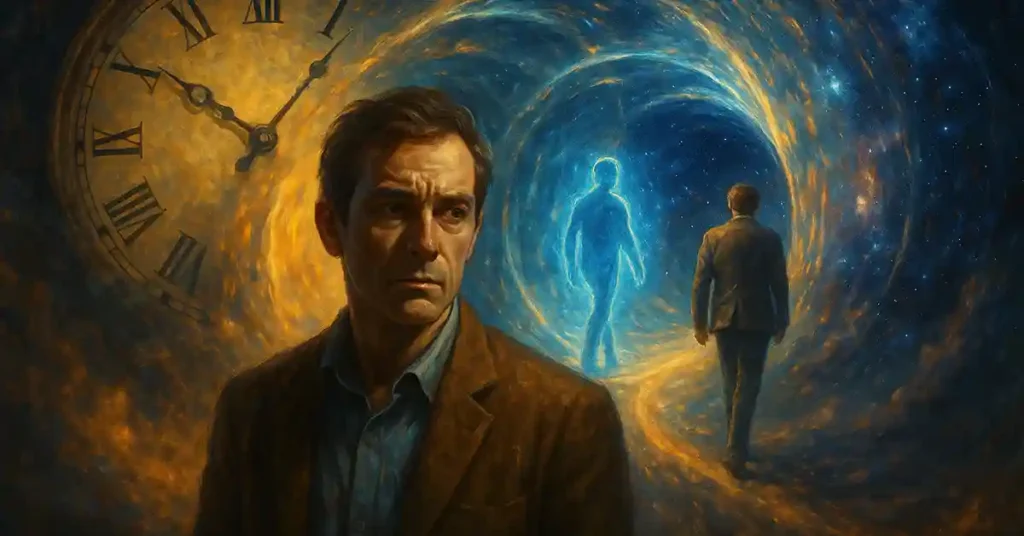Time travel stories thrill us because they force one unavoidable question: how can events cause—or erase—themselves? From Doctor Who to The Silent Guardian, writers rely on mind-bending paradoxes to test fate, free will, and even the fabric of logic. But what happens when philosophers and physicists tackle the same puzzles?
Below, we explore the philosophy of time travel explained in plain language, tracing classic paradoxes, competing theories of time, and why the debate is more relevant than ever.
1. Early Thought: Can Time Be Cyclical?
Long before H. G. Wells, ancient thinkers pondered temporal loops. The Stoics imagined an eternal return where history repeats forever, while Hindu cosmology speaks of yuga cycles. Though mythic, these models pre-figure later discussions about whether time might double back on itself.
2. Presentism vs. Eternalism
Modern philosophy frames the debate with two big ideas:
Presentism is the theory that only the present moment is real. According to this view, the past no longer exists and the future has yet to come into being. The implication for time travel is that it would be impossible—after all, you can’t visit something that doesn’t exist.
Eternalism, on the other hand, holds that the past, present, and future all exist equally. This theory suggests that time is like a four-dimensional block where every moment is fixed in place. As a result, time travel becomes conceptually possible because it would involve moving within this already-existing block of time.
Eternalism, favored by many physicists after Einstein, opens the door for the philosophy of time travel explained through relativity and world-lines.
3. Famous Paradoxes and Philosophical Responses
Grandfather Paradox – If you travel back and kill your grandfather, you erase your own existence.
Solution: The Novikov self-consistency principle (1975) argues that events in a closed time-like curve must be self-consistent; you would always fail.Bootstrap Paradox – A time traveler gives Shakespeare a copy of Hamlet. Who wrote it first?
Solution: David Lewis in “The Paradoxes of Time Travel” (1976) accepts information loops as strange but logically consistent if they don’t violate causality.Predestination Paradox – Your attempts to prevent an event cause it.
Solution: Philosophers like Michael Dummett note that this challenges the notion of free will but doesn’t contradict logic if the timeline is fixed.
4. Multiverse & Branching Timelines
Quantum interpretations (Everett, 1957) propose that every decision spawns a new universe. In this view, you can kill your grandfather—just not in the branch you came from. Works like Dark and Marvel’s Loki popularize this “many-worlds” escape hatch.
5. Free Will vs. Determinism
If time is a block, are we puppets?
Compatibilists like Daniel Dennett argue free will is the ability to act according to desires—even in a fixed timeline.
Hard determinists counter that choice is an illusion.
Stories such as The Silent Guardian dramatize this tension: Adam’s struggle against a predestined timeline asks whether moral responsibility survives in a deterministic universe.
6. Ethical Questions: Should We Change History?
Philosophers Thomas Nagel and Derek Parfit warn that moral knowledge of outcomes is always uncertain; meddling might make things worse. That uncertainty underpins narratives like 12 Monkeys and Looper, where “fixing” the future spirals into tragedy.
7. Why It Still Matters
Physics: Closed time-like curves appear in Gödel’s and Tipler’s relativistic solutions.
Technology: Quantum computing exploits retro-causality at the particle level.
Culture: Every new crisis (climate change, AI risk) revives the fantasy of going back to “set things right.”
Understanding the philosophy of time travel explained equips readers and writers to ask sharper questions about causality, responsibility, and hope.
Final Thought
Whether time is a mutable river or an unbreakable loop, grappling with its paradoxes sharpens our thinking about everything from physics to ethics. So next time a story bends chronology, remember: the real adventure lies in the questions it leaves behind.
